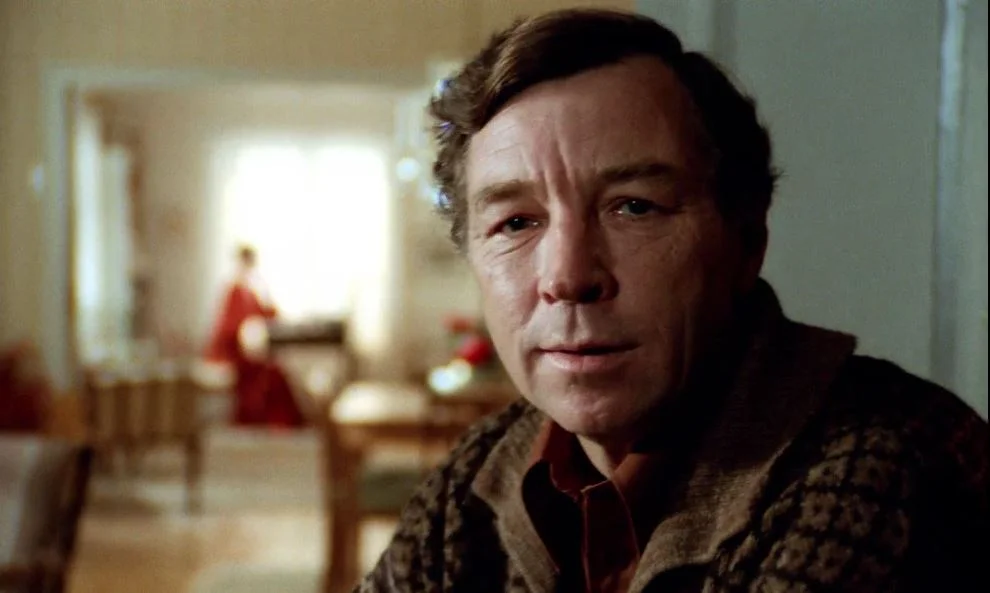The next film in our “Communicating Bergman” series is his 1978 film, Autumn Sonata. Echoing back to his chamber films of the early 1960’s, this film takes place over a period of one night and consists almost entirely of performances in close up of the two powerhouses, Ingrid Bergman and Liv Ullmann. These two devastatingly depict the fractured relationship between the famous concert pianist Charlotte (Bergman) and her oft-ignored daughter, Eva (Ullmann).
In relation to our series, Sonata is perhaps Bergman’s most literal and explicit condemnation of the spoken word as a means for communication. Notably, the film opens with Victor, who essentially functions as a narrator within the film, explaining that he searches for the words, for the ways to express his love for his wife Eva:
“I’d like to tell her just for once that she is loved wholeheartedly, but I can’t say it in such a way that she’d believe me. I can’t find the right words.”
As we watch, we eventually learn that her inability to accept love seems to stem from her childhood relationship with her mother who was “an expert at love’s intonations and gestures” but utterly unable to perform anything other than hollow, superficial, scripted lines. Instead, she does her best to explain that she was never taught, or shown, what it meant to be a tender, caring parent: “Only through music did I have a chance to show my feelings.”
All of this is in some way related for Bergman with his own parents, as well as his relationship to his children. You can feel a kind of fatalistic leaning within the film which asks, no begs, for an answer to the question: how can an artist, without a healthy emotional life, love others--be that children, friends, or lovers? Once again fractured, fictional identities conflate and Charlotte embodies both Bergman’s own mother, Karin Bergman, and himself. Birgitta Steene notes the epiphany that Ingmar reached when he spent time with his mother on her deathbed:
“His close contact with his dying mother, who revealed to him her own life-long frustrations, made him realize that the distant parent--an object whom he couldn’t reach as a child, was herself a suffering subject, a frightened human being who could not possibly give solace and support to her children, because she herself was not always sure of her own sense of self.”
Through the film, Bergman never excuses, never demonizes either Charlotte or Eva. Instead, he explains. Terrence Diggory notes that “In choosing such unlikely messengers, it is as if Bergman is testing our capacity for ‘love for the other children who are afraid, who are ill, who are cruel.’” He understands that it is too easy to make judgments and create a black and white world in which there are good people and bad people. Instead, he highlights the ways in which our world pushes through a lack of self-awareness--an inability to search, challenge, understand, or to communicate with the self. If one is “not always sure of [one’s] own self”, how can we hope to communicate or experience contact with another?
This brings us to another pervasive element in Bergman, constantly there is a character who is ‘perfectly’ loving and humble (at times even to a fault)--Marta in Winter Light, Marianne in Scenes from a Marriage, Viktor in Autumn Sonata, Alma in The Hour of the Wolf, Mia in The Seventh Seal. However, more often than not their love is not accepted, it is ignored, or it is grotesquely thrown back at them. As a result, Bergman expresses a poignant--though not necessarily original--idea that the efficacy of goodness, grace, and love is contingent upon the object of love’s ability and willingness to be loved.
To put it another way, love seems to be inherently divided between the subject who loves and the object of that love. And Autumn Sonata asks the question of what happens when the love cannot be received, or translated from the subject to the object? Bergman seems to show that those who cannot accept or receive love implicitly condemn those who love them to the role of a spectator, an audience member. For the example of Autumn Sonata, it seems to couple the fictional Viktor with us--the viewers outside of the narrative: Viktor can seemingly effect and act to the extent that the viewers can--i.e. not at all. Thus, the use of breaking the fourth wall (Viktor narrating and talking directly to the audience) seems to reflexively function in a way that explicitly ties him to the non-diegetic world-- ‘our’ world outside of the film. He is thus resigned to inaction, left with a kind of passive, castrated love which can, ostensibly, never be understood, accepted, or cultivated.
Despite the fact that the film is certainly not about Viktor, but about how ignorance of the self, ignorance of intention, miscommunication, and unfulfilled connections are pervasive--specifically here in a familial context. Eva spent her whole childhood and much of her adult life just trying to make her mother love her. Charlotte did not know what affectionate parenting looked like and thus did not offer love in such a way that her child or husband could receive.
If there is any hope at the end of this film, it remains for Bergman in the devastatingly hard work of psychological excavation. For some, Eva’s letter for Charlotte read to us by Viktor is indicative of another attempt, another try at repairing their severely fractured relationship. To others, it is merely the circle restarting, which will build and shatter, only to be rebuilt and shatter once again.
But…
But with this final letter, perhaps this could be Bergman ‘painting’ in chiaroscuro once again: a tiny pinhole of light made clear by the harsh, surrounding landscape.



